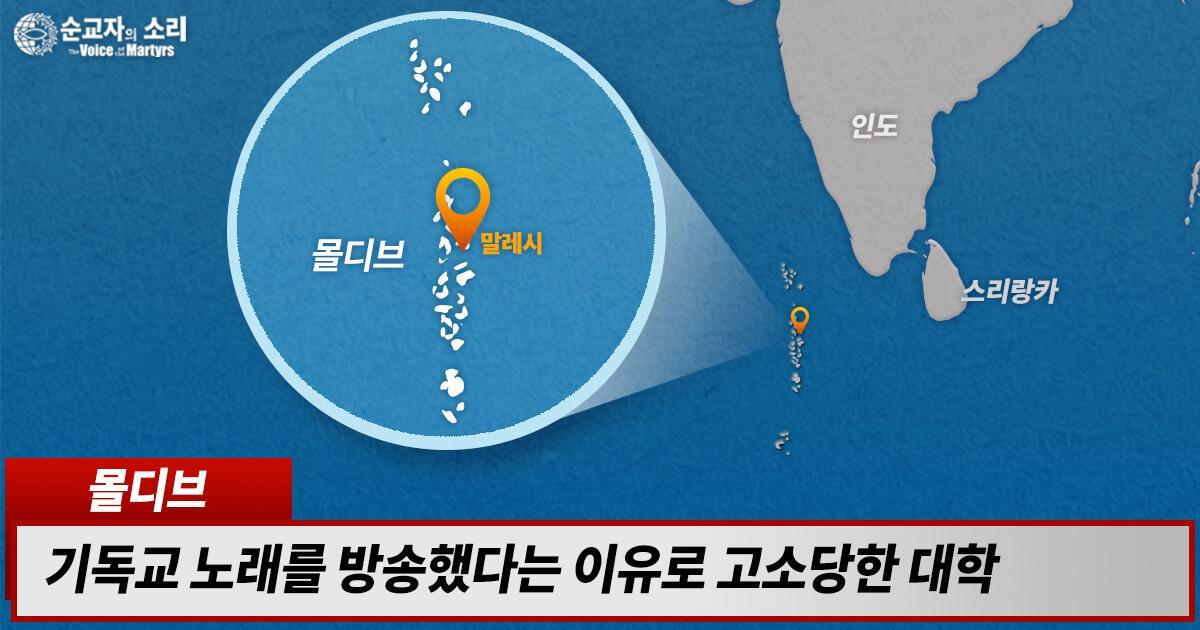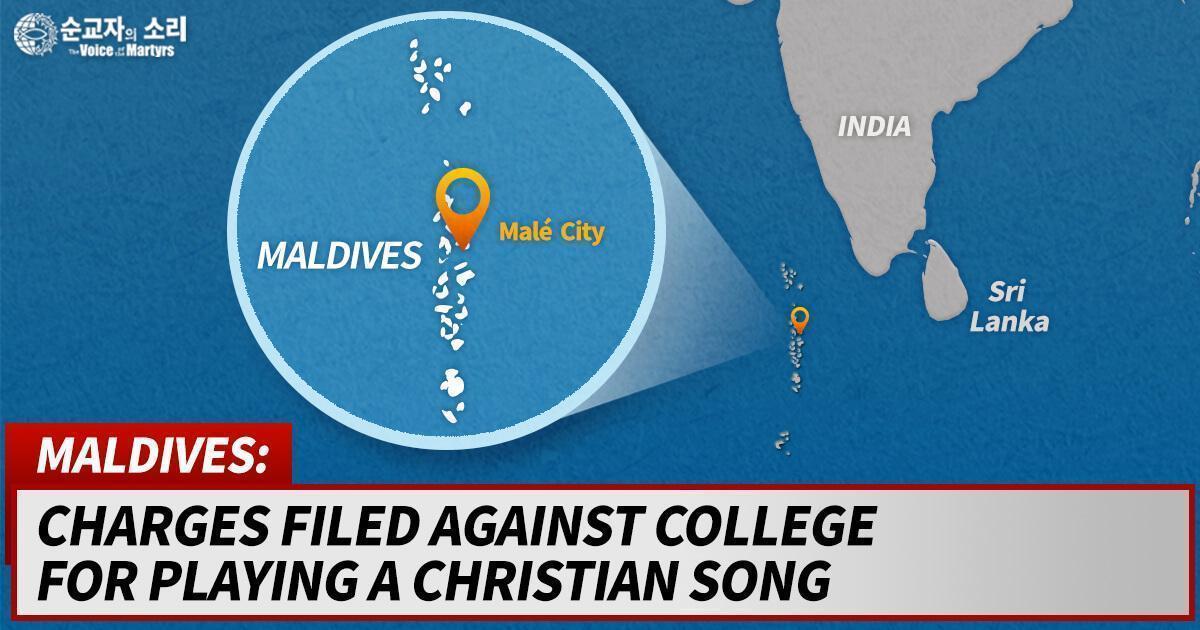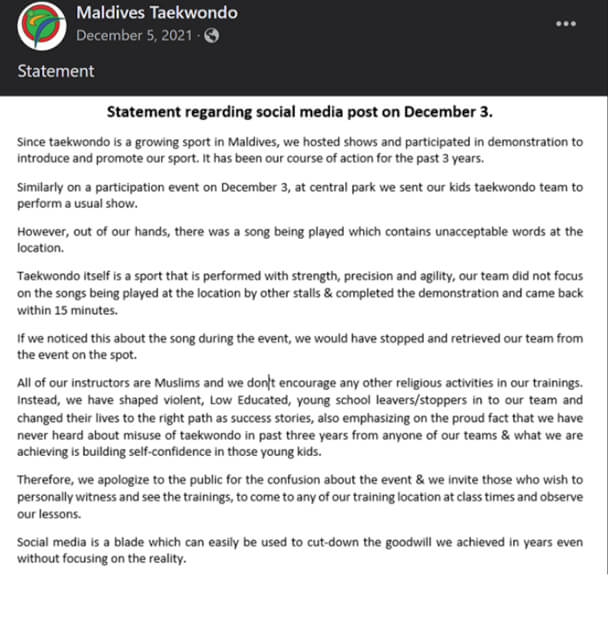
MALDIVES: CHARGES FILED AGAINST COLLEGE FOR PLAYING A CHRISTIAN SONG

A college in the Maldives which claims it played a Christian song by accident during a children’s sports festival is now facing a police investigation.
According to the Times of Addu, the Maldives media source which first reported the incident, Clique College says it had no desire to promote Christianity and no intention to play the Christian song, which they say auto-played from a playlist during a Taekwondo exhibition. The song’s lyrics reportedly included the words, “We believe in Jesus. We believe in Holy Spirit.” College officials say the song was changed as soon as the mistake was detected. The Taekwondo academy responsible for the exhibition similarly disclaimed responsibility on a Facebook post, saying that the music that was played was “out of their hands”.

The Times of Addu quotes an unnamed representative from the Maldives Islamic Ministry of Culture as saying, “[The Islamic Ministry has] filed the case of a Christian religious song played at an event held at the Hulhumalé Central Park at the police as a very serious matter. [We will] take legal action against organizers for such activities.”
The Times report added, “The Religious Unity Act (Act No. 6/94) prohibits the practice by citizens of any religion other than Islam.”
The U.S. State Department has previously raised concerns about restrictions on religious freedom in the Maldives, noting in its 2020 religious freedom report on the country that “Propagation of any religion other than Islam is a criminal offense, punishable by two to five years in prison or house arrest” and that the Maldives constitution “designates Islam as the state religion, which it defines in terms of Sunni teachings. It states citizens have a ‘duty’ to preserve and protect Islam.” The State Department report also notes that the legal code of the Maldives “prohibits the establishment of places of worship for non-Islamic religious groups.”
Voice of the Martyrs Korea Representative Dr. Hyun Sook Foley says her organization is currently monitoring the case against Clique College, as well as reports of an increased crackdown by Maldives authorities on Christian Internet and social media content in December 2021. “There have always been restrictions on Christian activity in the Maldives, but local media sources in the Maldives are reporting on a new criminal court order that was requested by police to ban online non-Muslim religious content, including Christian content, that is in the Dhivehi language of the Maldives,” says Representative Foley. She says the government’s action against Clique College does not surprise her. “We first learned about Clique College and the investigation into the Christian song simply from our organization’s regular daily global monitoring of news reports about Christian persecution. But as we have monitored the Maldives for years, we have seen time and time again how officials there have resisted and reacted against even the smallest signs of possible Christian activity. A group that recently wanted to do Christian radio broadcasting into the Maldives told us that they were dissuaded from their plans by the possibility of the Maldives taking diplomatic action against the country where the group was planning to originate the broadcast.”

A Facebook post from a Taekwondo academy in the Maldives disclaimed responsibility for a Christian song being played at a children’s sports exhibit in the officially Muslim country.
But Representative Foley says that such crackdowns against Christianity often spread Christianity rather than eliminating it. “God never leaves himself without a witness,” says Representative Foley. “It doesn’t even have to be a person. When there are no people to make a faithful witness, God can raise up rocks to cry out, as Jesus says in Luke 19:40. He can use a song that somehow plays by accident, like in this incident in the Maldives. Then a government files a complaint, a newspaper reports about it, and then God gives the readers of the newspaper report a curiosity in their heart to learn more. They ask, ‘Why is our government banning this? Why is it so dangerous?’ It’s human nature to seek out what is banned.”
Representative Foley says that her organization has seen a similar phenomenon at work in North Korea. She pointed to the example of workers sent abroad by the North Korean government. “North Korean workers have told us that they received a briefing from the government before they were sent abroad in which they were shown a Bible and told, ‘This is a Bible. Do not read this book.’ And then they were showing a picture of a church building and told, ‘This is a church building. Do not go here.’ The workers tell us that the first thing they want to do when they arrive in the new country is to find a Bible and a church building.”

A photo from the Clique College website. The College said it had no desire to promote Christianity and no intention to play Christian music at its event.
Representative Foleys says she expects a similar outcome in the Maldives. “Our experience at Voice of the Martyrs Korea is that when we see a government institute a new wave of crackdowns on Christianity, it’s frequently because they are responding to a new wave of Christian growth, and they panic and are afraid. Christians should rejoice when we hear about these crackdowns, because when God opens the hearts of people in a particular country to the gospel, no government can shut them.”
Representative Foley says that more information on Christian persecution in the Maldives is available from Voice of the Martyrs Korea at www.vomkorea.com/en/country-profile/maldives.

